简单句并列句复合句
- 格式:ppt
- 大小:72.00 KB
- 文档页数:14
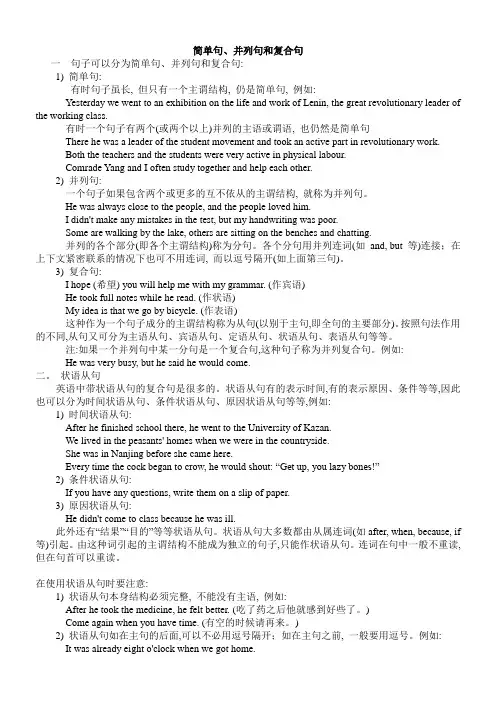
简单句、并列句和复合句一句子可以分为简单句、并列句和复合句:1) 简单句:有时句子虽长, 但只有一个主谓结构, 仍是简单句, 例如:Yesterday we went to an exhibition on the life and work of Lenin, the great revolutionary leader of the working class.有时一个句子有两个(或两个以上)并列的主语或谓语, 也仍然是简单句There he was a leader of the student movement and took an active part in revolutionary work.Both the teachers and the students were very active in physical labour.Comrade Yang and I often study together and help each other.2) 并列句:一个句子如果包含两个或更多的互不依从的主谓结构, 就称为并列句。
He was always close to the people, and the people loved him.I didn't make any mistakes in the test, but my handwriting was poor.Some are walking by the lake, others are sitting on the benches and chatting.并列的各个部分(即各个主谓结构)称为分句。
各个分句用并列连词(如and, but 等)连接;在上下文紧密联系的情况下也可不用连词, 而以逗号隔开(如上面第三句)。
3) 复合句:I hope (希望) you will help me with my grammar. (作宾语)He took full notes while he read. (作状语)My idea is that we go by bicycle. (作表语)这种作为一个句子成分的主谓结构称为从句(以别于主句,即全句的主要部分)。
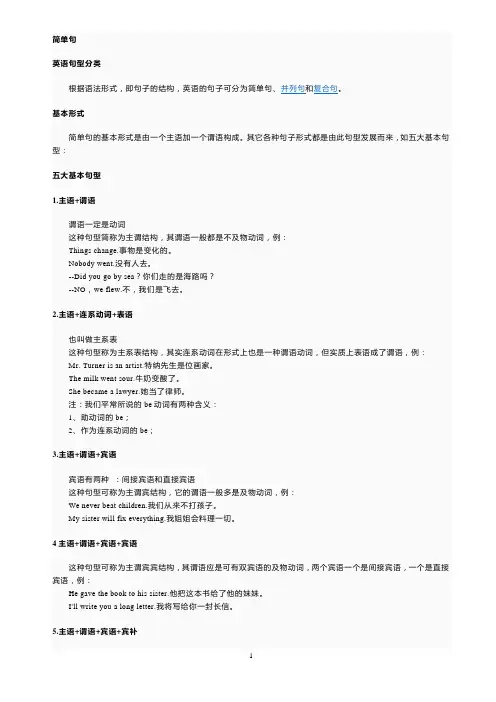
简单句英语句型分类根据语法形式,即句子的结构,英语的句子可分为简单句、并列句和复合句。
基本形式简单句的基本形式是由一个主语加一个谓语构成。
其它各种句子形式都是由此句型发展而来,如五大基本句型:五大基本句型1.主语+谓语谓语一定是动词这种句型简称为主谓结构,其谓语一般都是不及物动词,例:Things change.事物是变化的。
Nobody went.没有人去。
--Did you go by sea?你们走的是海路吗?--NO,we flew.不,我们是飞去。
2.主语+连系动词+表语也叫做主系表这种句型称为主系表结构,其实连系动词在形式上也是一种谓语动词,但实质上表语成了谓语,例:Mr. Turner is an artist.特纳先生是位画家。
The milk went sour.牛奶变酸了。
She became a lawyer.她当了律师。
注:我们平常所说的be动词有两种含义:1、助动词的be;2、作为连系动词的be;3.主语+谓语+宾语宾语有两种:间接宾语和直接宾语这种句型可称为主谓宾结构,它的谓语一般多是及物动词,例:We never beat children.我们从来不打孩子。
My sister will fix everything.我姐姐会料理一切。
4主语+谓语+宾语+宾语这种句型可称为主谓宾宾结构,其谓语应是可有双宾语的及物动词,两个宾语一个是间接宾语,一个是直接宾语,例:He gave the book to his sister.他把这本书给了他的妹妹。
I'll write you a long letter.我将写给你一封长信。
5.主语+谓语+宾语+宾补所谓宾语补足语就是补充说明前面的宾语这种句型可简称为主谓宾补结构,其补语是宾语补语,与宾语一起即构成复合宾语,例:I found the book easy.我发现这本书不难。
(形容词easy作补语)I'll let him go.我将让他去。
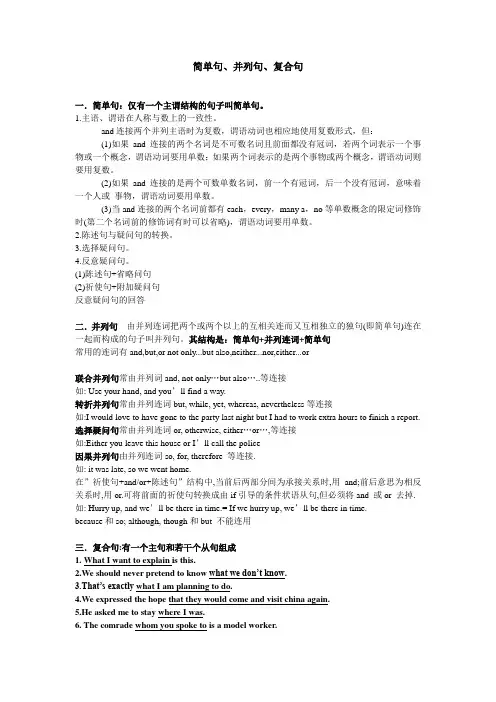
简单句、并列句、复合句一.简单句:仅有一个主谓结构的句子叫简单句。
1.主语、谓语在人称与数上的一致性。
and连接两个并列主语时为复数,谓语动词也相应地使用复数形式,但:(1)如果and连接的两个名词是不可数名词且前面都没有冠词,若两个词表示一个事物或一个概念,谓语动词要用单数;如果两个词表示的是两个事物或两个概念,谓语动词则要用复数。
(2)如果and连接的是两个可数单数名词,前一个有冠词,后一个没有冠词,意味着一个人或事物,谓语动词要用单数。
(3)当and连接的两个名词前都有each,every,many a,no等单数概念的限定词修饰时(第二个名词前的修饰词有时可以省略),谓语动词要用单数。
2.陈述句与疑问句的转换。
3.选择疑问句。
4.反意疑问句。
(1)陈述句+省略问句(2)祈使句+附加疑问句反意疑问句的回答二.并列句由并列连词把两个或两个以上的互相关连而又互相独立的独句(即简单句)连在一起而构成的句子叫并列句。
其结构是:简单句+并列连词+简单句常用的连词有and,but,or not only...but also,neither...nor,either...or联合并列句常由并列词and, not only…but also…..等连接如: Use your hand, and you’ll find a way.转折并列句常由并列连词but, while, yet, whereas, nevertheless等连接如:I would love to have gone to the party last night but I had to work extra hours to finish a report. 选择疑问句常由并列连词or, otherwise, either…or…,等连接如:Either you leave this house or I’ll call the police因果并列句由并列连词so, for, therefore 等连接.如: it was late, so we went home.在”祈使句+and/or+陈述句”结构中,当前后两部分间为承接关系时,用and;前后意思为相反关系时,用or.可将前面的祈使句转换成由if引导的条件状语从句,但必须将and 或or 去掉. 如: Hurry up, and we’ll be there in time.= If we hurry up, we’ll be there in time.because和so; although, though和but 不能连用三.复合句:有一个主句和若干个从句组成1. What I want to explain is this.2.We should never pretend to know what we don’t know.3.That’s exactly what I am planning to do.4.We expressed the hope that they would come and visit china again.5.He asked me to stay where I was.6. The comrade whom you spoke to is a model worker.。
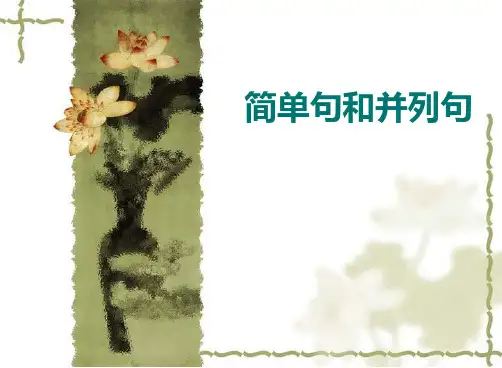
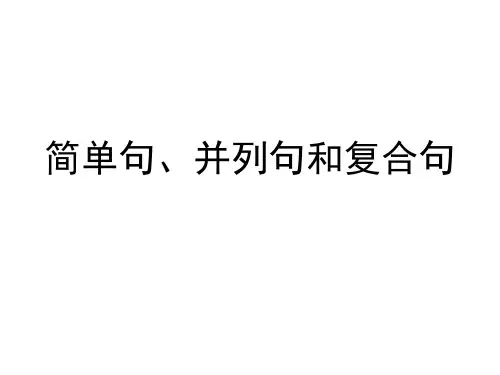
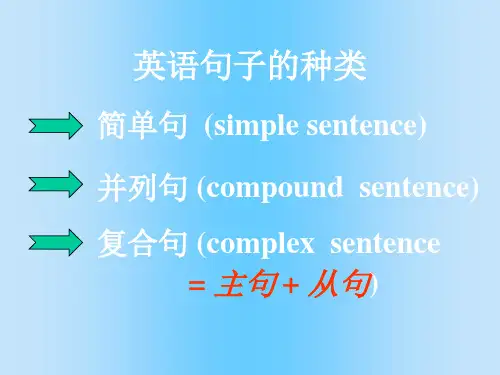
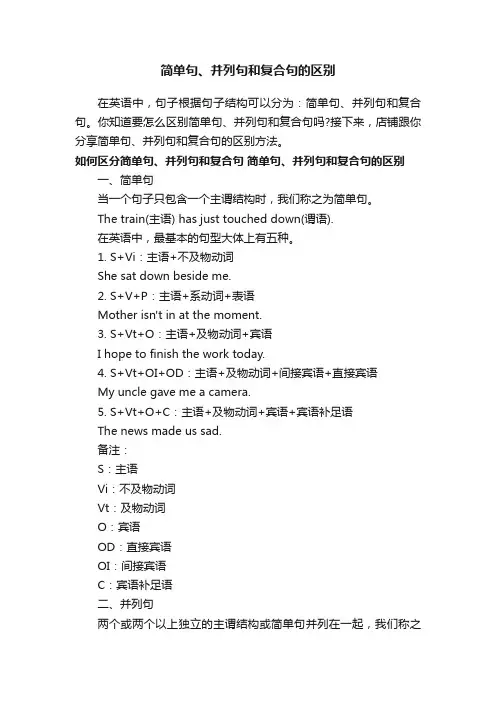
简单句、并列句和复合句的区别在英语中,句子根据句子结构可以分为:简单句、并列句和复合句。
你知道要怎么区别简单句、并列句和复合句吗?接下来,店铺跟你分享简单句、并列句和复合句的区别方法。
如何区分简单句、并列句和复合句简单句、并列句和复合句的区别一、简单句当一个句子只包含一个主谓结构时,我们称之为简单句。
The train(主语) has just touched down(谓语).在英语中,最基本的句型大体上有五种。
1. S+Vi:主语+不及物动词She sat down beside me.2. S+V+P:主语+系动词+表语Mother isn't in at the moment.3. S+Vt+O:主语+及物动词+宾语I hope to finish the work today.4. S+Vt+OI+OD:主语+及物动词+间接宾语+直接宾语My uncle gave me a camera.5. S+Vt+O+C:主语+及物动词+宾语+宾语补足语The news made us sad.备注:S:主语Vi:不及物动词Vt:及物动词O:宾语OD:直接宾语OI:间接宾语C:宾语补足语二、并列句两个或两个以上独立的主谓结构或简单句并列在一起,我们称之为并列句。
各个简单句间是平行并列的关系,而非从属关系。
并列句的各个分句间可用逗号、分号、起连接作用的副词或并列连接词来连接。
1. 能连接并列句的连词and(和,又),but(但是),for(因为),however(然而),or(或者),so(所以,因而),while(然而),yet(然而)2. 能连接并列句的复合连词or else(否则,要不然),either...or...(要么···,要么···;或者···,或者···),neither...nor...(既不···,也不···),not only...but also(不仅···,而且···)3. 能连接并列句的副词besides(而且,还有),hence(因此),otherwise(否则,要不然),then(然后,于是),therefore(因此,所以),thus(因而,从而) 根据并列分句之间的不同关系,并列句则可以分为以下四种。
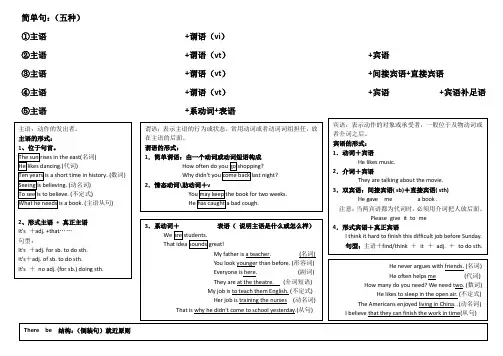
简单句:(五种)
①主语+谓语(vi)
②主语+谓语(vt)+宾语
③主语+谓语(vt)+间接宾语+直接宾语
④主语+谓语(vt)+宾语+宾语补足语
⑤主语+系动词+表语
并列句:简单句+连接词+简单句
1、是指由两个或两个以上并列而又独立的简单句构成的句子,其中简单句由并列连词连在一起。
并列连词连接的简单句叫做分句。
复合句:含有一个或一个以上从句的句子。
复合句包含:名词性从句(主语从句、宾语从句、表语从句和同位语从句)、定语从句和状语从句等。
定语用来修饰名词或代词,对名词或代词起修饰、限定作用的词、短语或句子,汉语中常用'……的'表示,通常位于被修饰的成分前。
状语用来修饰v.,adj.,adv.,或句子。
表示时间、地点、原因、目的、结果、程度、条件、方式和让步。
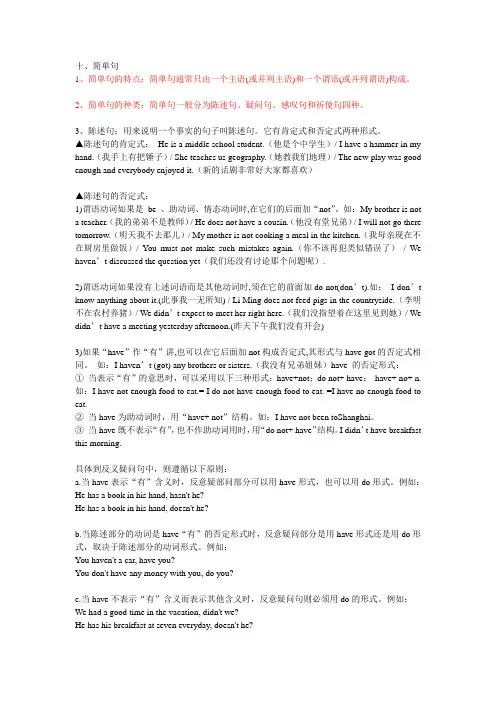
十、简单句1、简单句的特点:简单句通常只由一个主语(或并列主语)和一个谓语(或并列谓语)构成。
2、简单句的种类:简单句一般分为陈述句、疑问句、感叹句和祈使句四种。
3、陈述句:用来说明一个事实的句子叫陈述句。
它有肯定式和否定式两种形式。
▲陈述句的肯定式:He is a middle school student.(他是个中学生)/ I have a hammer in my hand.(我手上有把锤子)/ She teaches us geography.(她教我们地理)/ The new play was good enough and everybody enjoyed it.(新的话剧非常好大家都喜欢)▲陈述句的否定式:1)谓语动词如果是be 、助动词、情态动词时,在它们的后面加“not”。
如:My brother is nota teacher.(我的弟弟不是教师)/ He does not have a cousin.(他没有堂兄弟)/ I will not go there tomorrow.(明天我不去那儿)/ My mother is not cooking a meal in the kitchen.(我母亲现在不在厨房里做饭)/ You must not make such mistakes again.(你不该再犯类似错误了)/ We haven’t discussed the question yet(我们还没有讨论那个问题呢).2)谓语动词如果没有上述词语而是其他动词时,须在它的前面加do not(don’t).如:I don’t know anything about it.(此事我一无所知) / Li Ming does not feed pigs in the countryside.(李明不在农村养猪)/ We didn’t expect to meet her right here.(我们没指望着在这里见到她)/ We didn’t have a meeting yesterday afternoon.(昨天下午我们没有开会)3)如果“have”作“有”讲,也可以在它后面加not构成否定式,其形式与have got的否定式相同。
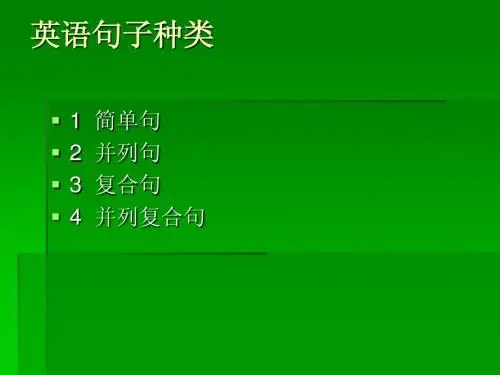
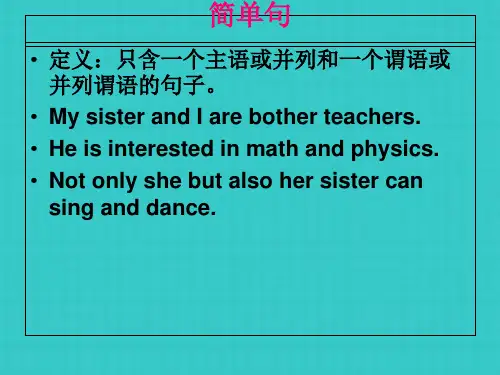
简单句、并列句和复合句句子按结构可分为简单句、并列句和复合句。
复合句中包含宾语从句、状语从句或定语从句等。
◆一简单句简单句就是只包含一个主谓结构的句子,其句式结构主要有五种:①主 + 谓。
He works in a big company. 他在一家大公司工作。
②主 + 系 + 表。
She is a kind girl. 她是一个善良的女孩。
③主 + 谓 + 宾。
Ann eats junk food twice a week .安一周吃两次垃圾食品。
④主 + 谓 + 间宾 + 直宾。
He gave me a pen .他给我一支钢笔。
⑤主 + 谓 + 宾 + 宾补。
He kept me waiting for two hours .他让我等了两小时。
◆二并列句并列句由两个或两个以上的简单句连接而成。
并列句中的各简单句同等重要,没有从属关系,是并列的关系,之间用并列连词连接。
1. 表示顺承的并列连词有and / not only …but (also)等。
如:She not only gaveus a lot of advice, butalso helped us to overcome difficulties .他不仅给了我们很多建议,而且还帮助我们克服困难。
2. 表示选择的并列连词有or,either …or …等。
如:Either you or Maria will haveto go .你或玛丽亚得去一趟。
3. 表示转折的并列连词有but,yet,however 等。
如:It is hot in summer here , butit’s not cold in winter .这里夏天热,但冬天不冷。
4. 表示因果关系的并列连词有so,如:He works hard , so he is one of the topstudents in our class .因为他学习努力,所以他是我们班最优秀的学生之一。
简单句、并列句、复合句根据语法形式,即句子的结构,英语的句子可分为简单句、并列句和复合句。
1简单句句型:主语+谓语只包含一个主谓结构,而句子的各个结构都只由单词或短语表示They are playing baseball in the garden.他们正在公园里打棒球。
Her brother and sister both are teachers.她的哥哥和姐姐都是老师。
2并列句句型:简单句+并列连词+简单句(常见的并列连词有and,but,or)并列句是由两个或两个以上的简单句连接而成。
并列句中的各简单句意义同等重要,相互之间没有从属关系,是平行并列的关系。
它们之间用连词连结。
Her father is a doctor and her mother is a teacher.I liked the story very much but Li Ming wasn''t interested in it.Hurry up,or you''ll be late.3 复合句句型:主句+连词+从句;或连词+从句+主句(包含一个主句、一个或一个以上的从句,或只包含一个从句,但有两个或两个以上的主句的句子叫复合句。
)复合句(The Complex Sentence):句子中有一个或一个以上的从句,叫做复合句。
复合句可分为:1).定语从句(The Attributive Clause);2).状语从句(The Adverbial Clause);3).名词性从句(The Noun Clause):一、定语从句定语从句的定义定语从句在句子中作定语,用来修饰一个名词、名词词组或者代词。
先行词和引导词被修饰的名词、名词词组或代词叫做先行词;在先行词和定语从句之间起连接作用的词叫做引导词。
引导词分为“关系代词”和“关系副词”。
关系代词和关系副词关系代词有:who, whom, whose, that, which, as。
简单句、并列句和复合句考点一简单句1.简单句只包含一个主谓结构.2.五种简单句:1)主+谓. He comes at last.2)主+系+表. She is a teacher.The soup tastes nice.3)主+谓+宾. They reached the village.4)主+谓+间宾+直宾. He gave me a pen.5)主+谓+宾+宾补. I find that book very useful.考点二并列句并列句:两个或两个以上的简单句,用连词连接起来;常用的连接词有:1.表示顺承关系的:and, not only…but also不仅….而且….等;She ______ gave us a lot of advice, _______ helped us to overcome difficulties.Linda tried to become an excellent teacher, _____ at last she succeeded.2.表示选择关系和否定条件的有or还是,否则Do you want to leave now ____ would you rather set off laterWear your coat, ____ you’ll catch a cold.3.表示转折关系的有but, yet等;He is young, but he works hard.虽然他年轻,但工作努力;4.表示因果关系的有for, so 等;My leg hurts so I go to see a doctor. 我的腿疼,因此我去看医生;考点三主从复合句:宾语从句1.宾语从句的引导词1引导陈述句用 that在口语和非正式文体中常常省略He tells me that he is going shopping this Sunday.2 引导一般疑问句用if或whether.She asked me if\ whether she could join us. whether…or not3 引导特殊疑问句,要用原来的特殊疑问词;She asked them what they were doing.2.宾语从句的语序:要用陈述句语序;I want to know when the train left.3. 宾语从句的时态1主句是一般现在时,一般将来时或祈使句,宾语从句可根据实际需要选用各种时态;He tells us that he has been able to look after himself.(2)主句是过去时态,宾语从句应使用过去时的相应时态;They said that they had already finished the work.(3)如果宾语从句叙述的是客观事实、真理、自然现象等,不管主句用什么时态,从句都用一般现在时;He said that light travels faster than sound.3. 练习1She asked me, “Will you go to the cinema tomorrow”改为含宾语从句的复合句She asked me______ I ______ go to the cinema the next day.2 How lovely the dog is Can you tell me _____A. where did you get itB. where will you get itC. where you got it3 --- Can you tell me _____ your parents at home--- I often wash clothes and sweep the floor.A.how will you helpB. how you helpC. how will you helpD. howdo you help4 When I was young, my grandfather told me that the sun ______ rise in the east.考点四状语从句一、状语从句在复合句中作状语,修饰主句中的动词、形容词、副词等;1.地点状语从句地点状语从句通常由 where 引导;Put all the things _____they were.A. whereB. whenC. whoseD. which2.时间状语从句主句用将来时,从句用一般现在时时间状语从句的引导词有when, before, after, until, as soon as, since, while, as 等She was cooking when someone knock at the door.What will you do after you finished your homework3.条件状语从句在条件状语从句中,常用的引导词有if, unless等;If it dosen’t rain, I” ll go fishing.They will have a picnic unless it rains next Sunday.4.原因状语从句原因状语从句常用的引导词有because, as, since既然等He didn’t come because he was ill.Since we are students, we should study hard.Because 和so 不能在一个句子中同时使用;5. 结果状语从句结果状语从句主要由so…that…, such…that…引导;It’s so hot that we want to go swimming.That’s such an interesting story that everybody likes it.So… that…与简单句之间的句型转换1)that后的句子是否定句,常用too…to进行转换;He is so young that he can’t go to school. he is too young to go to school.2)that后的句子是肯定句;常用enough to 进行转换;The shirt was so cheap that he bought it. the shirt was cheap enough for him to buy.6.目的状语从句目的状语从句常用的引导词有so that, in order that 等 in order to 简单句Please say it in a loud voice so that everyone can hear it.He works harder in order that he can go to a good college.7. 让步状语从句引导词有though, although, even if, even though尽管等;He often helps others though\ although he is not rich.They will stand by you even if you don’t succeed.Though, although与but 不能同时出现在一个句子中8.比较状语从句比较状语从句由than, as…as…, not as\so… as等引导;比较级He is more outgoing than I.He ran as fast as Mike.二、练习1. It’s quite common in Britain to say “thank you”to the drivers _____ people get off the bus.a. afterb. sincec. untild. when2. The art club is for members only. You can’t go in ____you are a member.a. unlessb. becausec. ifd. though3. Now many parents send their children to foreign countries, _____ they want them to get a better education.a. untilb. thoughc. because4. ---- What would some students like to do after finishing their education---- They would like to start to work_______ they needn’t depend on their parents completely.a. as soon asb. so thatc. befored. while考点五定语从句修饰某一名词或代词的从句叫定语从句;被定语从句修饰的词叫先行词,引导定语从句的词叫关系词关系代词和关系副词;1.关系代词的基本用法The man __________spoke at the meeting is from Hong Kong. 指人作主语The building ___________is being built will be used as a hospital.指物作主语I visited a scientist _______ name is known all over the world. 指人作定语2. 关系代词特殊用法1当关系代词在从句中作主语时,从句的谓语动词要与先行词保持一致;He is one of the boys who ______ like playing football.He is the only one of the boys who________ like playing football.2 通常以下四种情况关系代词只能用that而不能用which.1 先行词为all, much, something, everything, nothing, little, none, the one 等不定代词时2先行词被形容词最高级修饰时;3当先行词被the only, the very, the just等修饰时;4先行词中既有人又有物时;3. 关系副词的基本用法;1 when 在句中作状语,表示时间;2 where 在句中作状语,表示地点;.3 why 在句中作状语,表示原因;He remembers the day _______ he joined the League.This is the reason_______ he is late today.This is the place _______ Lu Xun was born.1. 2011泰安--- _______do you read English newspapers---I read China Daily every day.A. How longB. How soonC. How oftenD. How far2.2011抚州John had a short walk after lunch, _______A. did heB. didn't heC. had heD. hadn't he3.2011宁波--- _______do you have an Art Festival in your school---Once a year.A. How longB. How oftenC. How farD. How soon4.2011安徽省If you want to go to see the movie this evening, so _______I.A. doB. amC. willD. should5.2011长沙 _______tall the girl isA. HowB. HowaC. WhatD. What a6.2011长沙 _______ call me Mimi It's my cat's name.A. NotB. Didn'tC. Doesn'tD. Don't7.2011长沙They went to the park yesterday,_______A. don't theyB. didn't theyC. aren't theyD. can't they8.2011福州---Li Mei usually helps others, _______---Yes, she is kind-hearted.A. does sheB. is sheC. doesn't she9.2011眉山There _______an English party in our school tomorrow evening.A. haveB. will haveC. is going to haveD. will be10. 2011济南--- _______a year does your school have sports meetings---Twice a year.A. How oftenB. How soonC. How longD. How many times11. 2011泰州---I have changed my job.---_______.A. So do IB. So have IC. So I doD. So I have12. 2011济南Mike learns a lot about Internet. And _______.A. I don't, eitherB. so do IC. so am I am, too13. 2011眉山Jim never goes to the movies on Saturday, _______A. does JimB. doesn't JimC. doesn't heD. does he14. 2011玉州You've just finished your listening exam Please getyourself ready for the next part, _______A. shall weB. will youC. do youD. are you15. 2011眉山--- _______the weather like last Monday---It was sunny.A. How wasB. What'sC. What wasD. How is16. 2011潍坊_______great scientist Qian Xuesen isA. HowB. HowaC. WhatD. What a17. 2011眉山--- _______do you visit your grandparents---Once a month.A. How soonB. How longC. How muchD. How often18. 2011内江--- _______ do you speak English so well---Because I practice it with my partner every day.A. WhyB. WhenC. Who19. 2011泉州---We'll go to Qing Yuan Mountain tomorrow. Why _______join us---That's a good idea.A. notB. don'tC. can'tD. didn't20. 2011泉州There is little milk in the glass, _______A. is thereB. isn't thereC. isn't itD. does it21. 2011肇庆The students in Class Two played basketball against ClassOne yesterday,_____A. did theyB. didn't theyC. weren't they22. 2011宁波---What a new computer Can you tell me_______---Just the day before yesterday.A. how much you paid for itB. how much did you pay for itC. when you bought itD. when did you buy it23. 2011泰安---Tom wants to know if you will have a picnic tomorrow.---Yes. But if it _______, we'll play chess instead.A. will rainB. rainedC. is rainingD. rains24. 2011烟台---Do you know this dictionary belongs to---Let me see. Oh, it's_______.A. who does; mineB. who; meC. whose; mineD. who; mine25. 2011杭州Franklin told them all _______to be in Britain again.A. he was how happyB. how happy he wasC. how was he happyD. he was happy how26. 2011湖州---What kind of movies do you like---I like the movies_______ are about Chinese history.A. whoB. whomC. whoseD. that27. 2011丽水---Do you know _______---Sorry, I don't have a watch.A. whose watch this isB. whose watch is thisC. what time it isD. what time is it28. 2011重庆The woman asked the policeman where _______.A. the post office isB. the post office wasC. is the post officeD. was the post office29. 2011泰安---Can you guess_______ the new schoolbag yesterday.----Sorry, I've no idea.A. how much did he pay forB. how much he spentC how much he paid for D. how much did he spend30. 2011杭州Who is the man_______ is reading a book over thereA. thatB. whichC. whoseD. what31. 2011湖州---Do you know_______---Next Sunday.A. what they will doB. where they will doC. when they will come hereD. who they will meet32. 2011长沙---Can you tell me why_______---Because I want to help the people there.A. do you go to Tibet西藏B. did you go to TibetC are you going to Tibet D. you are going to Tibet33. 2011浙江省---Linda, could you tell me _______---He is an actor.A. what he doesB. what does he doC where he works D. where does he work34. 2011福州---Could you tell me _______---Sure. The day after tomorrow.A. when will you leave for the U.S.A.B. when Mr. Lee will comeC when your father returned35. 2011济南He asked me_______.A. who did kick the first goal in the World CupB. when was the A. PEC meeting heldC when China became a member of the WTOD. where will the 2008 Olympics be held36. 2011玉州Jane is one of the students in the class _______ have everbeen to China.A. whoB. whoseC. whichD. whom37. 2011济宁Can you tell me _______after this examA. what you didB. what did you doC. what will you doD. what you will do38. 2011苏州---Can you tell me how many colours _______ in a rainbow---SevenA. there areB. are thereC. they areD. are they39. 2011潍坊I can't understand _______Apple's iPad 2.A. why are they so mad aboutB. why they are so mad aboutC. how are they so mad aboutD. how they are so mad a。
简单句、并列句、复合句、并列复合句文章来源:互联网在前面各讲中所说的肯定句、否定句、各种疑问句、感叹句等,是根据句子的作用来划分的。
今天,我们再学习一种新的分类方法:即根据句子的内部结构,特别是句子与句子之间的关系来划分的方法。
根据句子结构,可以分为三种主要类型:简单句、并列句、复合句,另外还有一种叫并列—复合句子.要搞懂英语句子结构分类,有一点首先必须明白:即什么是“句子"?句子的概念有两层含义:一是它能表达一个清晰、完整的意思。
反过来讲,只要能表达一个清晰、完整的意思的语言单位,不论是长是短,哪怕是一个单词,也算作是一个句子。
这是从意义方面来说的.二是句子的结构完整。
所谓“完整”,最核心的是一个句子应该有“主语、谓语”.也就是说,有主语、有谓语的语言单位就是一个句子。
这就是从句子结构方面来分的,也是从句子语法成份方面来划分的。
我们所讲的简单句、并列句、复合句都是从主语、谓语来判定句子类型的。
如果按照句子的结构分类,英文句子可分为三种类型:简单句(Simple Sentence),并列句(Compound Sentence)和复合句(Complex Sentence).一、简单句简单句的定义是:或者只有一个主语,或者只有一个谓语.为什么说“或者”呢?因为简单句可以只有一个主语,但有几个谓语;或者可以有几个主语,但只有一个谓语。
这样一分,简单句就有三种形式了。
1、只有一个主语、一个谓语,再加上其它成份。
例如:Light travels faster than sound.光比声传播速度快。
The film is not interesting。
这部电影没有意思。
Can you finish the work on time?你能按时完成工作吗?2、只有一个主语,但有几个谓语,再加上其它成份。
例如:The boy were running, shouting and laughing.男孩们一边跑,一边笑,一边喊叫着。